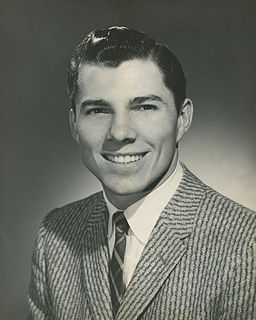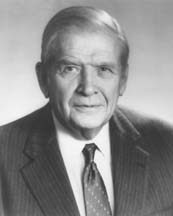
The United States Senate elections, 1978 in the middle of Democratic President Jimmy Carter's term. Thirteen seats changed hands between parties. The Democrats at first lost a net of two seats to the Republicans, and then one more in a special election. Democrats nevertheless retained a 58-41 majority.
George Corley Wallace III, generally known as George Wallace Jr., is an American politician from the U.S. state of Alabama.

The Alabama gubernatorial election of 1970 was marked by a competitive Democratic primary battle between incumbent moderate Governor Albert Brewer and segregationist former Governor and 1968 independent presidential candidate George Wallace. The Alabama Constitution was amended in 1968, allowing a governor to serve two consecutive terms.

The Alabama gubernatorial election of 1982 included the last campaign and final electoral victory of George Wallace. The election occurred on November 2, 1982. Incumbent Governor Fob James declined to run for a second term, allowing for an open election in 1982. In the Democratic primary, Wallace received challenges from Lieutenant Governor George McMillan, Speaker of the State House Joe McCorquodale, Jr., former Governor Jim Folsom, and Reuben McKinley. Because Wallace did not receive a majority of the votes, he advanced to a run-off with McMillan and then narrowly won the Democratic nomination. Montgomery Mayor Emory Folmar went unchallenged for the Republican nomination.

The Alabama gubernatorial election of 1958 was held on November 3, 1958. Incumbent Democrat Jim Folsom was term limited and could not seek a second consecutive term.

The Arkansas gubernatorial election of November 8, 1966 was the first time since Reconstruction that a member of the Republican Party was elected governor.
William Ryan DeGraffenried Sr. was an attorney and politician from Alabama. He was the son of Edward deGraffenried, former U.S. congressman from Alabama. He married Margaret Nell Maxwell in July 1945.

Electoral history of George Wallace, 48th Governor of Alabama, 1968 American Independent Party Presidential nominee and candidate for 1964, 1972 and 1976 Democratic Party presidential nomination

The North Carolina United States Senate election of 1968 was held on 5 November 1968 as part of the nationwide elections to the Senate. The general election was fought between the Democratic incumbent Sam Ervin and the Republican nominee Robert Somers. Ervin won re-election to a third full term, with over 60% of the vote.

The 1970 United States Senate election in New York was held on November 3, 1970. Incumbent Republican U.S. Senator Charles Goodell, who had been appointed to the seat by Governor Nelson Rockefeller in 1968 following the assassination of Sen. Robert F. Kennedy, sought a full term. Goodell was challenged by Democrat Richard Ottinger and Conservative James Buckley. Buckley prevailed.

The 1974 Massachusetts gubernatorial election was held on November 5, 1974. Michael Dukakis was elected to a four-year term, from January 4, 1975 until January 4, 1979. He defeated incumbent Governor of Massachusetts Francis W. Sargent in the general election.

The 1970 Massachusetts gubernatorial election was held on November 3, 1970. Acting Governor Francis W. Sargent was elected to a four-year term. He defeated incumbent Boston Mayor Kevin H. White in the general election.

The 1964 Massachusetts gubernatorial election was held on November 3, 1964. Former Governor John A. Volpe was elected to a two-year term. He defeated former Lieutenant Governor Francis X. Bellotti in the general election.

The Alabama gubernatorial election of 1966 took place on November 8, 1966, and saw the election of Lurleen Wallace as Governor over U.S. Representative James D. Martin. Incumbent Democrat George Wallace was term limited and could not seek a second consecutive term.

The 1974 Georgia gubernatorial election was held on November 5, 1974. Under Georgia's constitution at the time, incumbent Democratic governor Jimmy Carter was ineligible to serve a second consecutive term. He was elected President of the United States in the 1976 presidential election. George Busbee was elected as the 77th Governor of Georgia.

The 1936 Arizona gubernatorial election took place on November 3, 1936. Incumbent Governor Benjamin Baker Moeur ran for reelection, but he was defeated in the Democratic primary by former judge of the Maricopa County Superior Court Rawghlie Clement Stanford.

The 1942 Arizona gubernatorial election took place on November 3, 1942. Incumbent Governor Sidney Preston Osborn ran for reelection, and easily defeated a challenge from former Governor Robert Taylor Jones in the Democratic primary, who Osborn also defeated in 1940.

The 1960 Arizona gubernatorial election took place on November 8, 1960. Incumbent governor Paul Fannin ran for reelection against former Democratic state representative Lee Ackerman in the general election, easily winning a second term. Fannin was sworn into his second term on January 3, 1961. Both candidates ran unopposed in their respective party's primary.

The 1966 Arizona gubernatorial election took place on November 8, 1966. Incumbent Governor Samuel Pearson Goddard ran for reelection to a second term as Governor, narrowly winning the Democratic Party nomination as he was challenged by Justice of the Peace Norman Green.

The 1986 United States Senate special election in North Carolina was held on November 8, 1986 as part of the nationwide elections to the Senate. Incumbent Republican U.S. Senator Jim Broyhill, who had been appointed in June 1986 to serve out the rest of John Porter East's term, faced off against the popular Democratic former Governor Terry Sanford. This was a special election for what little remained of the 99th United States Congress, being held contemporaneously with a regular election for a new six-year term. Sanford won both elections.
























